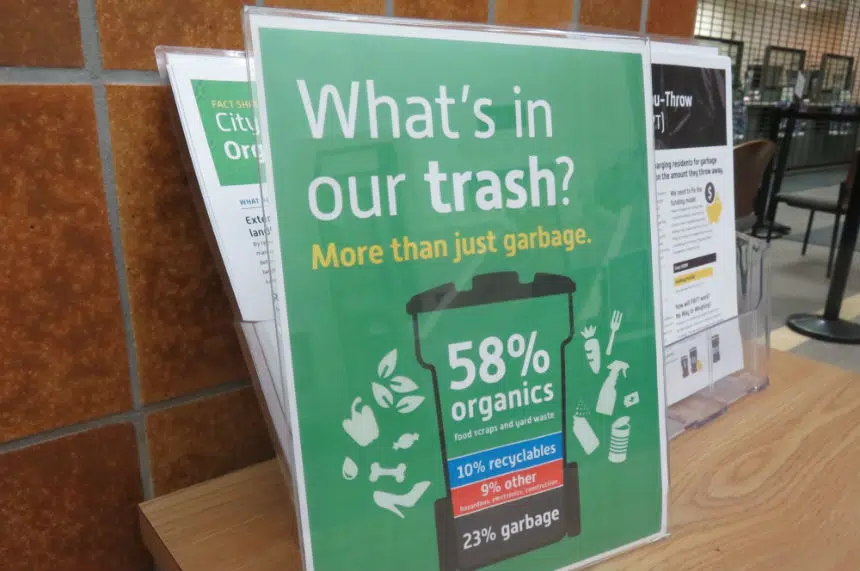Saskatoon will be implementing a curbside organics collection program, but how it will be funded is still to be decided.
City council voted 7-4 Monday afternoon in favour of supplying green carts to homeowners after four hours of debate over how it would be paid for.
Councillors wandered back and forth during discussions on whether to fund organics and a new format for garbage collection through a monthly utility bill to homeowners, or to increase property taxes to pay for it.
Ultimately, a 6-5 vote pushed a decision on the funding model back to council’s Nov. 19 meeting as councillors asked for more clarity surrounding costs.
City administration first suggested the organics bin in June, along with a garbage collection system with different sized black bins, in a bid to increase waste diversion in Saskatoon.
Currently, the Bridge City ranks near the bottom of major Canadian cities with a 23 per cent waste diversion rate. City council has established a goal to increase the diversion rate to 70 per cent.
Administration reports have indicated nearly 60 per cent of the waste going from homes to the landfill could be placed in an organics bin instead.
The goal would be to extend the life of Saskatoon’s landfill by 23 years. A new landfill would cost the city approximately $160 million.
City staff have advised council action is required even if a waste utility wasn’t approved, because waste management is currently underfunded by at least $2 million annually and a reserve filling the funding gap has been depleted.
“We have a funding problem and an environmental problem,” Ward 7 Coun. Mairin Loewen said.
She also challenged councillors opposed to the proposed programs.
“Okay, then what?” she asked.
If funded through a monthly utility bill, waste collection costs would be removed from property taxes – resulting in a 3.5 per cent reduction for homeowners as well as businesses and multi-family units.
The reduction would translate to a savings of $75 for the average home valued at $371,000.
However, the combined costs of organics and waste would result in a minimum monthly bill of $18 for residents, if they chose a black bin half the size of the current one supplied by the city.
The current size – which would be considered a “large” cart in the new program – would start at a cost of $22.80 per month and increase to $36.50 a month by 2023 to encourage downsizing to other cart sizes.
Ward 6 Coun. Cynthia Block questioned the rationale of giving businesses a tax break while asking residents to pay more.
“I’m really struggling with the fairness of this,” she said, noting she supports the idea behind a waste utility but needed to establish a fairer solution.
Councillors had delayed a decision on the proposed waste utility in September, asking for more information from administration on what the program would look like if it were funded through property taxes.
A report submitted to council Monday indicated funding both organics and waste collection through property taxes would translate to an increase of between 3.9 and 4.9 per cent, a cost of $85.20 on the average residential tax bill.
Ward 1 Coun. Darren Hill put forward motions to separate the two programs, having organics funded through property taxes and garbage collection paid for through a monthly utility, but none of his colleagues supported the bid.
Administration advised against funding organics through a property tax, saying research from other cities indicated residents would view the green bin as “free” and there would be more non-organic garbage thrown in the bin – thus contaminating the contents.
Ward 3 Coun. Ann Iwanchuk challenged that notion, saying citizens speak to her often about what they’re paying for through property taxes.
“I find that an offensive comment and it doesn’t give our citizens due credit,” she said.
Iwanchuk opposed the establishment of the curbside organics program, saying she didn’t believe it would provide enough waste diversion for the cost.
“It would take my family six to eight months to fill,” she said, noting there are worries about the smell organics bins would produce.
Councillors Bev Dubois, Troy Davies and Darren Hill also voted against the organics program – though Hill noted he only opposed it based on questions surrounding funding.
Mayor Charlie Clark voted in favour of the green bin program along with councillors Mairin Loewen, Zach Jeffries, Cynthia Block, Sarina Gersher, Randy Donauer and Hilary Gough.
Hill’s motion to defer a vote on how to fund the organics program and waste collection was supported by Mayor Charlie Clark and councillors Block, Loewen, Gough and Gersher.
Davies, Iwanchuk, Donauer, Dubois and Jeffries voted against the deferral.
Councillors also edged towards including multi-family units like apartment and condo buildings into the organics program, approving a motion to include the intention of implementing multi-family unit organics collection by 2020 into any private sector request for proposal. The vote passed 8-3, with Davies, Iwanchuk and Dubois against.











